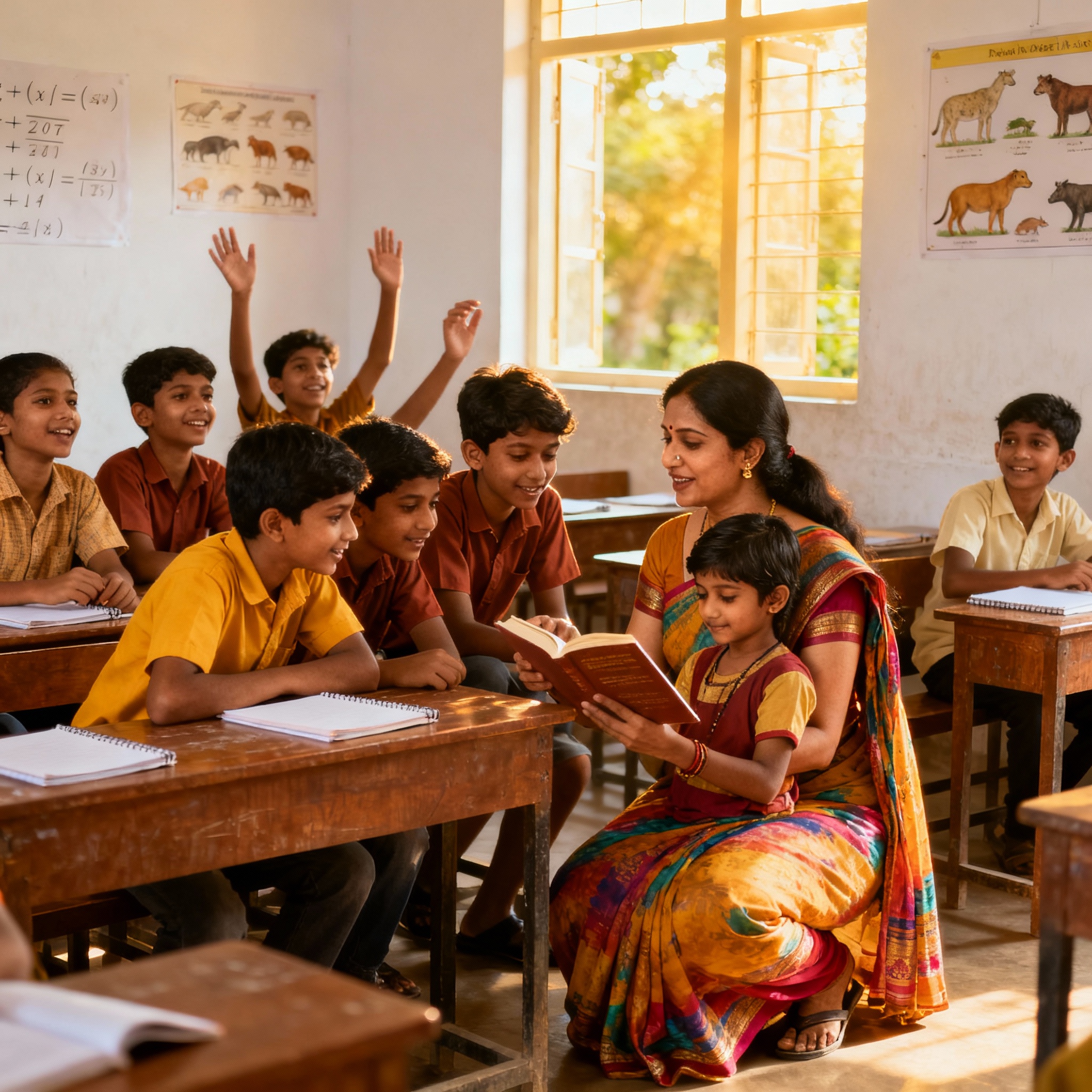The Irreplaceable Role of Teachers in Indian Education: Insights from UDISEPlus 2024-25 and Global Perspectives
At Education for All in India, we firmly believe that neither in schools nor colleges can a teacher be replaced by technology. Technology can enhance the teaching-learning process, but the indispensable human connection provided by teachers remains unmatched. Moreover, Indian classrooms are not yet ready for a wholesale technological transformation without foundational investments in both teachers and infrastructure.

A classroom in a school in India
Teacher Shortages and Infrastructure Challenges in Indian Schools
The latest UDISEPlus 2024-25 data marks a milestone, with India crossing one crore teachers for the first time. This has improved pupil-teacher ratios across all school levels: Foundational (10:1), Preparatory (13:1), Middle (17:1), and Secondary (21:1). Despite this progress, serious concerns persist. Over 100,000 schools operate with a single teacher, and close to 8,000 schools report zero student enrollment while still employing teachers. Such inefficiencies underscore the urgent need to optimize resource allocation and rationalize school operations.

Chart showing school infrastructure availability and teacher profile indicators for Indian schools in 2024-25
Furthermore, many schools lack essential infrastructure such as computers, internet access, reliable electricity, and inclusive facilities for children with special needs. These gaps limit the potential of technology to support quality education effectively. For comprehensive analyses, see our detailed articles below:
- School Infrastructure Insights from UDISE+ 2024-25
- Single-Teacher Schools & Schools without Enrolment Analysis
Global Expert Views: Technology Should Empower, Not Replace Teachers
Professor Guy Littlefair, Deputy Vice-Chancellor (Education and Student Experience) at The University of Western Australia, recently emphasized that technology must empower teachers rather than diminish the essential human connection in education. He advocates embedding global academic excellence into India’s entrepreneurial and research ecosystems, prioritizing faculty development and faculty-student interactions.
Read his full interview: Transforming Global Education—Professor Guy Littlefair on Australia-India Partnership
“Technology is just a tool. In terms of getting the kids working together and motivating them, the teacher is most important.” — Bill Gates
Bill Gates believes AI and other technologies can personalize learning and provide intelligent feedback but insists teachers remain critical for mentoring and creativity. Relevant links:
- Improving Education for All | Bill Gates
- Bill Gates Explains Why Classroom Technology is Failing Students and Teachers
India’s Education Priorities for a Balanced Future
Recognizing UDISEPlus 2024-25 findings and expert insights, India must prioritize:
- Resolving teacher shortages and optimizing teacher deployment to reduce inefficiencies such as zero-enrollment schools employing teachers.
- Investing in infrastructure upgrades to ensure reliable electricity, internet connectivity, computers, and accessibility.
- Committing to continuous teacher training and professional development to empower educators to effectively integrate technology without losing the human touch.
- Using technology as a complementary aid that bolsters, rather than replaces, the indelible role of teachers.
Our Call to Action
At Education for All in India, we emphasize that technological innovation must never overshadow the human heart of education. The latest UDISEPlus data and global education leaders’ perspectives validate our enduring conviction: investment in teachers and fundamental infrastructure must come before large-scale technology adoption. This approach will help build an inclusive, future-ready education system that honours and uplifts teachers and learners alike.


